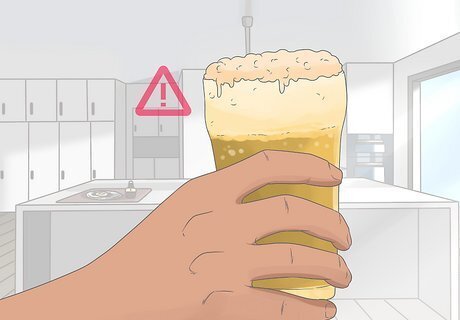
views
Lifestyle Changes

Find ways to express your feelings. You might tend to take your feelings out on other people. These people don’t deserve your aggression, mean words, or cruel actions. If you struggle with how to release your emotions in a beneficial way, try keeping a journal or talking to a trusted friend. Learn to identify and label your feelings. For example, if you want to react in a rage, stop and think to yourself, “I’m feeling angry because someone cut me off.” Find healthy outlets for your feelings. Engage in stress relief techniques to help you cope with stress and not let it out inappropriately. Reader Poll: We asked 267 wikiHow readers, and 53% of them admitted that they typically respond to negative emotions by lashing out at others. [Take Poll] Instead, try journaling or taking deep breaths to calm yourself.

Practice gratitude. Get in the habit of giving thanks. Increasing the gratitude in your life can lead to incredible benefits such as increased happiness and well-being. It can also help you see the good in everything around you. Keep a gratitude journal as a way to reflect on the things you are grateful for each day. Be grateful for small things. If someone offers you help or does something kind for you, give thanks for that small gesture.

Increase your self-awareness. Gain some perspective on yourself and your life by reflecting on it regularly. Set aside some time each day to reflect on your day and your life. Keep a journal, pray, meditate, or take a thoughtful walk. If a situation doesn’t sit right from the day, reflect on what could have gone differently or that you’ll do in the future. Become aware of your own thoughts and feelings as they occur. Increasing your awareness in the moment can help you respond to situations as they occur.

Seek therapy. If you can’t seem to understand why you’re a jerk or how to improve, a therapist can help. Your therapist can help you work through emotions and make meaningful changes to your thoughts and behaviors. Your therapist is someone you can talk to, trust, and lean on for support when you need it. Find a therapist by contacting your insurance provider or local mental health clinic. You can also get a referral from your physician or a recommendation from a friend or family member.

Take care of your mental health. If you’re depressed, anxious, or suffer from other mental health problems, address them. Get medication, talk to a therapist, and cope with your problems as effectively as you can. Ignoring your mental health can lead to interpersonal problems, and people may understand your difficulties as you being a jerk. If you have an addiction, for example, seek treatment by attending rehabilitation. For example, people may see you as aloof and self-absorbed when you’re actually suffering from depression and having difficulty concentrating and relating to others.

Attend a social skills class. Being perceived more positively and acting in a positive way can be as easy as understanding how to relate to people differently. You might struggle in knowing how to treat other people or engage in healthy interactions. Social skills training can help you recognize verbal and nonverbal communication and how best to respond to it. You can also learn anger management techniques through a class or program.
Adjusting Your Behavior

Avoid manipulative behavior. If you purposefully manipulate people to get what you want, people might see you as a jerk. Maybe you make demands or put people in a bad position in which you end up on top. Don’t exploit other people’s weaknesses or convince them to give up something for your own gain. Find compromises when you want something. Be willing to give something up on your own so that other people feel like exchanges are fair.

Practice humility. Maybe you’re an excellent student or a gifted athlete or martial artist. You should definitely be proud of your accomplishments, but don’t go around gloating about them. People may get sick of hearing you talk about your accomplishments. Let your work and abilities speak for themselves. If you’re excited or proud of an accomplishment, share it with a small group of people instead of boasting about it loudly all over school or in your workplace.

Avoid using alcohol or other substances. Alcohol and drugs can alter your behavior, often for the worse. If you know you tend to be an angry drunk or aggressive when you take drugs, keep away from these things. Caffeine can also make people feel grumpy or anxious. Take note of how things affect your mood and stay away from substances which affect you negatively.

Seek feedback. Go to someone who knows you and ask for their help. If you say something stupid, give them permission to point it out and let you know that it was inappropriate. Use a code word or just have them talk to you later about your words or behaviors and why they were uncool. For example, if you realize that you get very aggressive or insulting at certain times, ask those closest to you to inform you when you are doing so and attempt to stop doing it.

Do some good. Make an effort to give back in some way. Start volunteering at an animal shelter or after-school program. Offer your time or expertise at fundraisers. Give back to your community and do things out of the goodness of your heart. Be generous with your time, love, and resources. Be kind for the sake of being kind. This charitable behavior can help influence you to do more good and be kind and loving to people.
Speaking Kindly

Use your manners. Simply saying “Please” and “Thank you” can show other people that you are well-mannered and care about their feelings. Thank people for gifts, help, and thoughtful consideration. Think about how your actions affect others. If you’re not sure how someone feels, ask them, “Do you mind if I do this?” For example, if you use your cell phone in public, be mindful of those around you and don’t talk loudly or carry on long conversations with someone in front of you.

Make requests, not demands. If you need or want something, ask for it instead of demanding it. People like to feel like they have a choice and that their help is appreciated. Respect other people’s needs and consider their feelings when you make a request. Allow people to feel like they can say, “No” without fearing your wrath or upset. For example, say, “I’d really appreciate your help with this project. Can you show me how to do this?” instead of saying, “I can’t do this and need you to show me.” If someone cannot complete a request, keep your cool. Everyone has their own schedules and needs, too.

Speak less. If you tend to be a loudmouth, consider taking a few steps back and finding out what it feels like to be more silent. If your first impulse is to speak, work on taking a beat before responding. This can help you think before spreading rumors, saying stupid comments, or insulting someone. Your comments may be annoying or unwarranted. If you want to say something, let other people speak first before chiming in.


















Comments
0 comment